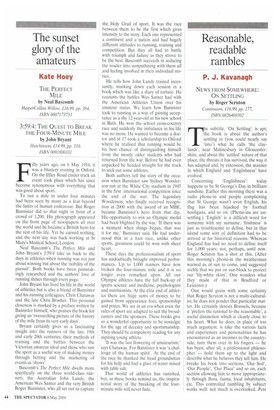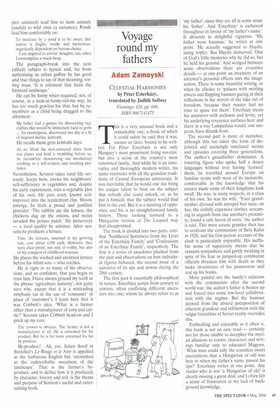Reasonable, readable rambles
P. J. Kavanagh NEWS FROM SOMEWHERE: ON SETTLING by Roger Scruton Continuum, £16.99, pp. 177, ISBN 0826469302 T'e subtitle, 'On Settling', is apt; the book is about the author's settling in (you could nearly say into') what he calls 'the claylands', near Malmesbury in Gloucestershire, and about the 'settled' nature of that place, the threats it has survived, the way it has adapted and, by extension, the manner in which England and 'Englishness' have evolved.
Concerning 'Englishness': today happens to be St George's Day in brilliant sunshine. Earlier this morning there was a radio phone-in and people complaining that St George wasn't even English, his flag has been hijacked by football hooligans, and so on. (Phone-ins are unsettling.) 'English' is a difficult word for someone with my surname. 'Irishness' is just as troublesome to define, but in that island some sort of definition had to be arrived at for historical reasons. Whereas England has had no need to define itself for 1,000 years; not, perhaps, until now. Roger Scruton has a shot at this. (After this morning's phone-in the weatherman warned us of sun to come, and suggested archly that we put on sun-block to protect our lily-white skins'. One wonders what they made of that in Bradford or Leicester.) One would guess with some certainty that Roger Scruton is not a multi-culturalist; he does not ponder that particular matter. He certainly detests Brussels, because it 'prefers the rational to the reasonable', a useful distinction which is clearly close to his heart. What he does, in place of too much argument, is take the various facts and experiences and personalities he has encountered as an incomer to the countryside, turn them over in his fingers — he has been, after all, a professional philosopher — hold them up to the light and describe what he believes they tell him. He breaks his book into sections, 'Our Soil', 'Our People', 'Our Place' and so on, each section allowing him to move appropriately through flora, fauna, local inhabitants, etc. This controlled rambling by subject works well: not much is overlooked. Pets
(not admired) lead him to farm animals (useful) to wild ones (a nuisance). Ponds lead him comfortably on:
To meditate by a pond is to be aware that nature is fragile, murky and mysterious, organically dependent on human choice.
I am inspired to similar thoughts, too, when I contemplate a muck-heap.
The paragraph-break into the next (allied) subject is typical and, far from authorising an urban guffaw he has good and true things to say of that steaming, rotting mass. 'It is ointment that heals the battered landscape.'
He can be funny when required; not, of course, in a look-at-funny-old-me way, he has too much gravitas for that, but he remembers as a child being dragged to the allotment:
My father had a genius for discovering vegetables that would be immensely hard to grow his masterpiece, discovered one day in a fit of inspired malice, kohlrabi.
He recalls those grim kohlrabi days:
As we lifted the snot-coloured slime from our plates and held it trembling before us, he meanwhile denouncing our involuntary retching as a self-evident and insulting pretence.
Nevertheless, Scruton takes rural life seriously, keeps hens, envies his neighbours' self-sufficiency in vegetables and, despite his early experiences, tries a vegetable plot of his own. He puts every known soilimprover into the recalcitrant clay. Shoots emerge, he feels a proud and justified provider. 'The rabbits ate the lettuce, the chickens dug up the onions, and moles invaded the potato patch.' He perseveres — a local quality he admires. After seasons he produces a lettuce.
True, the lettuces, assessed at my growing rate, cost about £100 each. However, they were clear proof, not only of virility, but also of my conquest of childhood traumas.
He places the washed and anointed lettuce before his infant son — who retches.
He is right in so many of his observations, and so confident, that you begin to trust him. I have always ground my teeth at the phrase 'agriculture industry', not quite sure why, except that it is a misleading emphasis (as in the use of 'consumer' in place of 'customer'). I learn here that it was Cobbett's idea. 'What is a farmer other than a manufacturer of corn and cattle?' Scruton takes Cobbett head-on and I prick up my ears:
The answer is obvious. The farmer is not a manufacturer at all. He is esteemed for his product. But he is far more esteemed for his by-product.
By-product? Ah, yes. Julien Sorel in Stendhal's Le Rouge et le Noir is appalled at the barbarous English but 'astonished at the indescribable sweetness of the landscape'. That is the farmer's byproduct, and to define how it is produced, by character, history and toil, is the theme and purpose of Scruton's useful and entertaining book.













































































 Previous page
Previous page